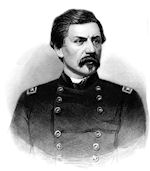
—Colonel Allen of the First Regiment N. Y. S. V., was arrested at Fortress Monroe for court martial, by order of General Butler.—The Eleventh Regiment of Massachusetts Volunteers, under the command of Colonel George Clark, Jr., left Boston for the seat of war. The regiment, previous to their starting, were encamped at Camp Cameron. They were enlisted in April last, and sworn into the United States service about three weeks ago. They number 950 men, and are all armed with new smooth-bore Springfield muskets. In point of equipage, no regiment, perhaps, has exceeded the Eleventh. Their camping arrangements are complete, and they will enter upon their duties with no less than twenty-five baggage wagons, and eighty horses. So complete, indeed, are their arrangements that they will be dependent on the Government for nothing except food and ammunition.—N. Y. News, June 30.
—The steamer St. Nicholas was captured in the Potomac River, by a party of secessionists. The steamer left Baltimore, having on board about fifty passengers. Among those who went aboard previous to her departure, was a very respectable “French lady,” who was heavily veiled, and, pleading indisposition, she was immediately shown to her state-room, where she was kindly cared for by the females on board. There were also a party of about twenty-five men dressed in the garb of mechanics, carrying with them carpenters, tinners, blacksmiths’, and other tools. When near Point Lookout, the “French lady ” appeared on deck, not in crinoline, but in the person of a stalwart man, who was immediately surrounded by the party of mechanics above alluded to. Captain Kirwan of the steamer, demanded an explanation, when the “lady-man” informed him that he designed confiscating the steamer and going on a privateering expedition. Finding himself overpowered, Capt. Kirwan was compelled to submit, and the boat was handed over to the man and his crew, who took possession, and proceeded to run the steamer to a point known as “The Cone,” on the Virginia shore. Upon landing at that place, the steamer was boarded by a body of about 1,000 Virginia troops, when the passengers were all landed, and allowed to go on their way. About one hundred and fifty of the troops were then placed on board the steamer, Captain Kirwan and fourteen of the crew being retained as prisoners. Leaving the shore the steamer was run down as far as the mouth of the Rappahannock River, where the “new Captain” hailed three large brigs which were lying off a few miles from Fredericksburg. These vessels were immediately boarded, and not having a sufficient force on board to offer any resistance they were all then quietly delivered over to the party as prizes. The prizes, one of which was laden with coffee, a second with ice, and the third with coal, were run into Fredericksburg, Virginia, and delivered into the possession of the Virginians, the steamer being kept at that port, together with her captain and crew.—Baltimore American, July 2.
—An elaborate article respecting the constitutional power of the President of the United States to suspend the writ of habeas corpus, was published. It was prepared by Reverdy Johnson, of Maryland, in response to the opinion of Chief Justice Taney, of the Supreme Court of the United States.—(Doc. 58.)
—The Fifteenth Regiment N. Y. S. V., under the command of Colonel John McLcod Murphy, left Willet’s Point, N. Y., for Washington.
Two regiments, one of Alabamians and the other of Mississippians, reached Harper’s Ferry, Va., this morning, and destroyed the balance of the trestle work of the railroad bridge. They then went over to the Maryland shore, seizing all the boats they could lay their hands on, either breaking them up or taking them over the river. All the Union men of Harper’s Ferry were driven out by them.—N. Y. Herald, June 30.
—A skirmish took place at Bowners, twelve miles from Cheat River bridge, between portions of the Fifteenth and Sixteenth Ohio, the First Virginia regiments, and a company of rebel cavalry. The former were sent to protect the polls, and the latter, mistaking their number, attacked them, and were routed with the loss of several men, among them the lieutenant of the company. Several horses were captured. The only loss on the Federal side is N. O. Smith, of the Fifteenth Regiment.—Louisville Journal, July 1.
—The Twenty-fifth Pennsylvania Regiment, stationed at Washington, left that place for Edward’s Ferry. Lieutenant Hamilton H. Dutton, of Mississippi, having tendered his resignation, was dismissed from the navy of the United States.
An imposing ceremony took place this afternoon at Washington, in the President’s grounds on the front of the White House toward Virginia. The New York 12th Regiment of Militia, with Company G United States Infantry, formed a hollow square, enclosing the fountain and a pavilion, under which were the President and Mrs. Lincoln, surrounded by the members of the Cabinet and other distinguished gentlemen. The Rev. Dr. Pyne offered a fervent prayer for the Union, law and good Government, the well-being of the nation and of its appointed rulers, and the peace which comes with the restoration of order.
While the Marine Band was playing, the President hauled up the flag, which was slightly torn in the process. Simultaneously, cannon roared and shouts went up from the throng of civilians and lines of soldiers.
The soldiers having gone through with a leaf of the manual, cheers for the flag and the President were given heartily. Gen. Scott, with his staff and other officers, were on a portico adjoining.—N. Y. Tribune, June 30.
—During last night there was a skirmish between the New Jersey Zouaves and the rebels outside of Fall’s Church, Va. Two of the rebels were killed, and one of the Zouaves was wounded. The dead bodies were brought to Washington this morning.—N. Y. Commercial Advertiser, June 29.


